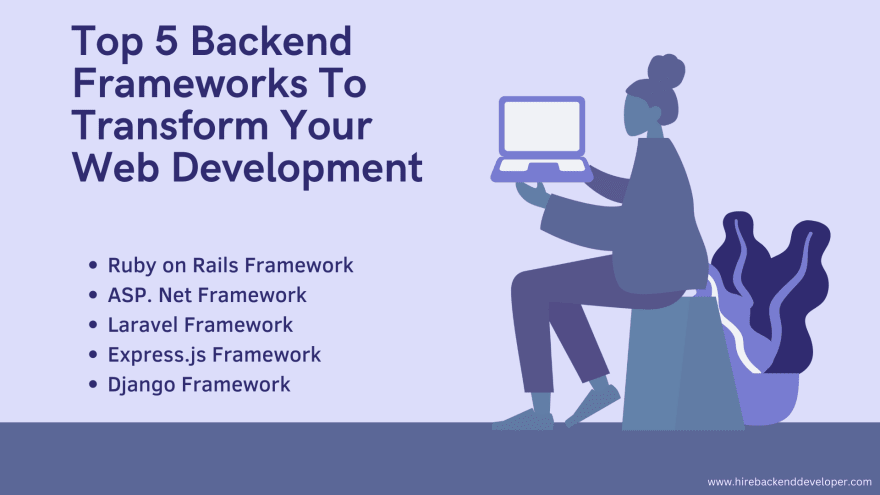
Nishita Avalani
Posted on November 2, 2022
Technology development has greatly increased innovation in web and mobile applications. Regardless of an organization's sector vertical or functional competence, the concept of digital transformation today affects all organizations. There are two main divisions when we consider to develop a web app: frontend and backend. Every front-end developer starts with the browser and its advantages when tackling a project. Backend developer, however, uses a database that runs on server to carry out the operations of sites.
Companies leverage the most popular frameworks, libraries, and tools in an effort to give their customers valuable output. The standards of web development have increased throughout time as a result of the introduction of frameworks and APIs. Frameworks are currently an integral component of web development when creating interactive and sophisticated web applications. For both frontend (client-side) and backend (server-side) web development, a variety of frameworks are available.

Backend frameworks are collections of server-side computer languages that aid in creating a website's backend framework. Backend frameworks give developers ready-made parts for creating dynamic web applications. By removing the requirement to create and configure everything from scratch, framework use gives developers a leg up.
The selection of the best backend web development framework mostly depends on the functionality required in the application because backend frameworks can be created in a variety of languages, including Python, PHP, Ruby, and Java.
Here are the top 5 backend web development frameworks that will still be in demand in 2023 among programmers.
1) Ruby on Rails framework: The Ruby on Rails framework for server-side web applications is accessible under the MIT licence. RoR is a perfect framework that comes with everything a developer needs to create excellent apps, and it is supported by a sizable and welcoming community.
RoR's salient characteristics include:
The Model-View-Controller (MVC) architecture is used by Ruby on Rails.
RoR stresses the Don't Repeat Yourself (DRY) and Convention-over-Configuration (CoC) concepts.
The framework makes it simple to adapt existing code.
The Rails community actively seeks out and fixes new vulnerabilities.
2) ASP.NET Core: It is an open-source variant of ASP.NET that was first released in 2016. It is an update to the prior ASP.NET Windows-only versions. ASP.NET Core is a well-liked web development framework that is significantly speedier than the majority of already accessible frameworks for building web apps on the.NET platform.
ASP.NET Core's salient characteristics are:
Multiple versions of ASP.NET Core can exist on the same server;
ASP.NET apps can run on Windows, Linux, macOS, and Docker;
the framework is designed to allow runtime components, APIs, languages, and compilers to evolve quickly;
it offers a variety of support lifecycle options to meet app-specific needs.
3) Laravel: It is an open-source PHP framework built on the MVC design that was first introduced in 2011 and released under the MIT license. The ideal backend technology for creating blogs, news, and e-commerce websites is Laravel. The creation of safe and cutting-edge online apps is made easier with Laravel's user-friendly interface, built-in API support, and vast libraries. Laravel is a relatively new framework that is user-friendly for beginners. It has the following features:
Own command-line interface (CLI)
Supports simple PHP code,
has a Blade template engine that produces lightweight frontend templates,
has excellent community and documentation
Database migration mechanism
4) Express.js: Due to its cutting-edge features, international brands like IBM and Accenture rely on the popular Express.js framework. Express.js is quite flexible and enables REST API apps. Express, sometimes known as Express.js, is a straightforward Node.js web application framework that offers the following basic web development features:
Fast and efficient web framework with a minimal design
Simple to set up and learn
Excellent routing API
Accessibility of many plugins for use
Provides a variety of HTTP utility functions to create perceptive and dynamic APIs
5) Django: One of the most well-known open-source Python frameworks, Django was first released in 2005. Django is frequently referred to as the web framework for perfectionists with tight deadlines since it is built on the DRY (Don't Repeat Yourself) principle, which emphasises reusing existing code and focuses on new sections to speed up developer work. Due to its higher security, Django is frequently used to create FinTech apps, booking engines, and e-commerce systems. Some of its important features are as follows:
Highly scalable and adaptable
Promotes quick development
Strong community support and thorough documentation
Model-View-Template (MVT) framework with high level and batteries integrated
Amongst some hundreds of thousands of applications built using above frameworks are:
1)Ruby on Rails Framework: Shopify, Airbnb, GitHub, Hulu, etc
2)ASP. Net Framework: Stack Overflow, CodePlex, MarketWatch, CodeProject, etc
3)Laravel Framework: Invoice Ninja, Alison, Barchart, MyRank, AlphaCoders, etc
4)Express.js Framework: Netflix, Uber, PayPal, LinkedIn, Yahoo, Mozilla, GoDaddy, Ebay, etc
5)Django Framework: Instagram, Spotify, YouTube, Mozilla, NASA, Dropbox, etc
There are many potent frameworks for backend web development, each with essential characteristics and capabilities. Depending on your project requirements and the knowledge of a web developer on your team, you can choose the best web frameworks.
Are you still uncertain about using a backend framework?
To schedule a free consultation, contact Hire Backend Developer. You can choose the ideal framework for backend development with the aid of our team of specialists after you have validated your idea.

Posted on November 2, 2022
Join Our Newsletter. No Spam, Only the good stuff.
Sign up to receive the latest update from our blog.